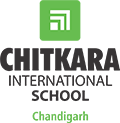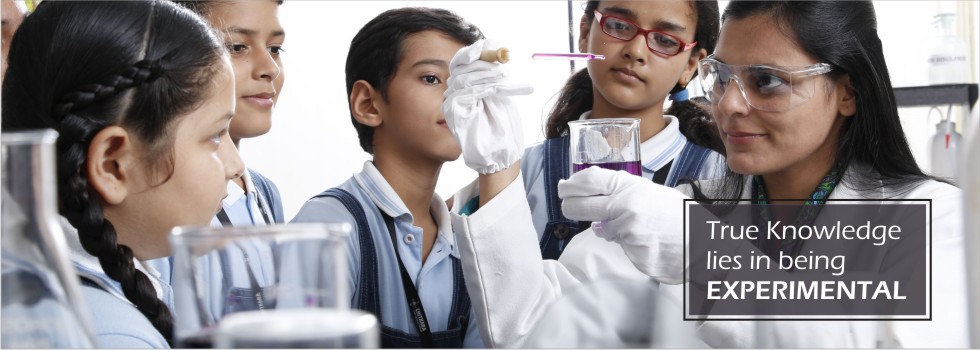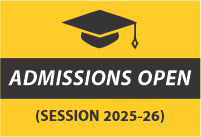Academic Framework
Education is about far more than the marks fetched by a student. It’s about understanding right from wrong and having the current and comprehensive knowledge required to stay afloat in today’s society. Therefore, Chitkara International School helps the children to develop a perception on the world around and push their thinking both creatively and conceptually in many subject areas. Small group instruction, personalized attention for all the learners, flipped classrooms, blended learning, self directed learning allow teachers to thoroughly assess them during their work. Curriculum is developed keeping in mind all the three types of learners namely visual, auditory and kinaesthetic thereby touching the learning needs of a learner. We believe that each child rises to meet high expectations. Teachers encourage them to take intellectual risks, stretch socially, expand their ideas and investigate central issues.
Programs available at CIS
This is a school with a long tradition of academic excellence and creativity within an exceptionally warm and supportive environment.
-
Kindergarten Programme
Our expansive and innovative early years centre offers a safe and stimulating environment for our youngest boys and girls, encompassing Chicklets (2-3 years), Nestlings (3-4 years), Fledglings (4-5 years), and Cygnets (5-6 years).
-
Primary School Programme
Our Primary Programme, spanning Grade 1 to Grade 5 (6 years onwards), smoothly transitions students from the vibrant world of kindergarten to the equally colourful domain of primary learning.
-
Middle and High School Programme
Catering to Grade 6 to Grade 10, our Middle and High School Programme efficiently transitions students from middle to high school and further into diverse higher education programmes offered by various colleges and universities.
-
Senior Secondary Education School Programme
Our Senior Secondary School Programme (Grade 11 & Grade 12) acts as a gateway to Higher Education, interwoven with a strong industry connection.
All objectives are united in the pursuit of providing an individualised learning environment, allowing students to learn at their own pace and achieve mastery in their studies. Our pedagogy begins with inquiry, moves into presentation, controlled practice, and then advances to free practice. The ultimate goal is to ensure that the learning process is student-friendly, engaging, and enables easy comprehension of concepts by our students.
The academic framework commences with the Annual Blueprint, outlining the child’s academic or overall development for the entire year. This framework acts as an umbrella encompassing three learning processes centred around the child: Teaching, Learning, and Assessment intertwined with Technology. Understanding the framework from different perspectives is easier:
-
Teaching Framework
The teaching framework, tailored around the learner’s needs, focuses on preparing children for the future. It incorporates a flexible yet resourceful structure that includes unique processes like inquiry, eliciting, presentation, controlled practice, free practice (The 3 P’s Pyramid used at Chitkara International School), Weaving, Chaining, Drilling, Error correction, and Feeding. Our faculty undergoes rigorous training from planning a lesson to ensuring that each child comprehends the concept, considering the varying needs and abilities of each child. The teaching framework is centred on Generation Z (children born after 2003) and Alpha Generation learners (children born after 2010).
-
Learning Framework
Designed after studying the psychology of diverse learners and their learning styles, the learning framework involves a unique blend of teacher talk time (30%) and student talk time (70%). Information is elicited from students rather than simply provided, ensuring that lessons are planned to achieve the desired learning outcomes. The introduction and design of concept maps for every lesson help students thoroughly absorb the concepts, enabling them to articulate their understanding. Various learning situations, including group work, role plays, peer learning, and self-study, are provided for students to adapt to diverse learning scenarios.
-
Assessment Framework
The assessment framework isn’t just a test for the child; it’s an invaluable learning experience and an addition to their existing knowledge. It incorporates both scholastic and co-scholastic areas of learning with innovative practices and the latest trends in assessment. Scholastic assessment involves “Assessment of Learning” and “Assessment for Learning,” aiming to understand the true score of the learner through tools like Classical Test Theory, Item Response Theory, Partial Credit model, Scoring Weight Scores, and Confidence Level Rating. Diagnostic assessments help identify gaps in learning, allowing for corrective feedback to ensure a smooth learning process. Co-scholastic assessments utilise appropriate grading scales to evaluate holistic development, encompassing areas like health, personality, social skills, and attitudes.
-
Technology Framework
Technology is interwoven into teaching, learning, and assessment processes at Chitkara School, making it a school for 21st-century learners. This framework extends beyond scholastic domains, introducing TEK-8, a comprehensive hands-on technology curriculum. Comprising seven modules—Computer Science, Electronics, Mobile Technology, Automobiles, Robotics, Household Technology, and Energy Management—this innovative curriculum is designed by Subject Matter Experts and Faculty Members of the R&D Team at Chitkara University and Chitkara International School. These modules are meticulously designed and tailored to meet current and future learning needs, ensuring that students are equipped for the hi-tech world and future industrial demands.
The Technology Framework for academic areas also involves digital learning through various aids like Progate, School Cinema, SchoolPad, Math Buddy, and ExtraMarks. Technology doesn’t just support teaching, learning, and assessment; it is a catalyst for pedagogical change.
-
E-Learning
Virtual connectivity remains paramount at Chitkara International School (CIS), with the school stakeholders staying connected throughout the year via the school’s ERP system, SchoolPad. Amid the global pandemic, the school swiftly transitioned from physical to digital environments. By employing effective e-learning strategies and functional digital learning tools, the school continues to provide quality education to its students on the digital platform.
-
Learning Management System
To administer, document, track, and deliver educational lessons, the school employs the highly effective Learning Management System (LMS) – Microsoft Teams. Each student is provided with their Teams IDs and Passwords at the beginning of the session. Additionally, students receive free access to beneficial MS Office Tools for academic purposes.
Apart from conducting academic lessons, co-curricular activities, health and counselling sessions, the school provides students with informative resources such as Home Timetables, Anecdotes, PPTs (with narrations), Worksheets, Video links, Home Learning Sheets, Textbook PDFs, E-links, Assessment Sheets, Planners, and Practice Logs, ensuring a comprehensive learning experience.
